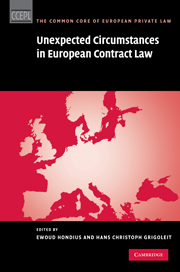Book contents
- Frontmatter
- Contents
- List of contributors
- Books in the series
- General editors' preface
- Preface
- List of abbreviations
- Part I Introduction and context
- 1 Introduction: An approach to the issues and doctrines relating to unexpected circumstances
- 2 Legal history
- 3 Law and economics: the comparative law and economics of frustration in contracts
- Part II Overview
- Part III The case studies
- Part IV General comparative remarks
- Appendix: Some Texts on Change of Circumstances
- Selected bibliography
- Index
- References
1 - Introduction: An approach to the issues and doctrines relating to unexpected circumstances
Published online by Cambridge University Press: 04 April 2011
- Frontmatter
- Contents
- List of contributors
- Books in the series
- General editors' preface
- Preface
- List of abbreviations
- Part I Introduction and context
- 1 Introduction: An approach to the issues and doctrines relating to unexpected circumstances
- 2 Legal history
- 3 Law and economics: the comparative law and economics of frustration in contracts
- Part II Overview
- Part III The case studies
- Part IV General comparative remarks
- Appendix: Some Texts on Change of Circumstances
- Selected bibliography
- Index
- References
Summary
Setting the scene
A contract, once concluded, binds the parties and is intended to remain binding even if the circumstances change. For instance, if the financial position of one of the parties changes, his or her need for the object of the contract alters or the value of the object goes up or down, the validity of the contract itself will not be affected. However, some occurrences that go beyond the reasonable expectations of the parties may raise serious doubts as to the binding nature of contracts. For instance, what about the effect of events such as natural disasters, an oil crisis, an armed conflict or – to mention a quite recent significant event – a fundamental financial crisis? These or similar issues have been dealt with by courts in all European legal systems at some point and the historical perspective (cf. Chapter 2) reminds us that the issue of how to deal with unexpected circumstances has a long tradition in jurisprudence. In this Introduction we shall begin our comparative analysis with a survey of the central questions that dominate the issue of unexpected circumstances and prepare the ground for the more detailed analysis in the overview and case studies.
The eventualities of life are infinite and, therefore, the legal issues referring to unexpected circumstances present a kaleidoscopic picture. Still, it is possible to identify some categories of fact patterns that occur regularly and involve specific issues.
- Type
- Chapter
- Information
- Unexpected Circumstances in European Contract Law , pp. 3 - 14Publisher: Cambridge University PressPrint publication year: 2011
References
- 1
- Cited by

